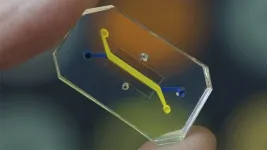By Benjamin Boettner
(BOSTON) — The Biomedical Advanced Research and Development Authority (BARDA), part of the Administration for Strategic Preparedness and Response (ASPR) at the U.S. Department of Health and Human Services (HHS), partnered with the Wyss Institute at Harvard University to support the Institute in advancing its human Organ Chip platform and drug discovery capabilities to better understand the illness and injuries that result from a broad range of health security threats, including high doses of radiation, as well as predicting and evaluating potential treatments.
A collection of human Organ Chips, which have been developed by the team of Wyss Founding Director and Principal Investigator on the award, Donald Ingber, M.D., Ph.D., over the past 15 years, have unique potential for filling this gap. Importantly, the recently passed FDA Modernization Act 2.0 enables the FDA to consider data generated in human in vitro models, including human Organ Chips, in lieu of animal data during new drug evaluations, thus potentially greatly accelerating the clinical advancement of life-saving medical countermeasures (MCMs).
“Our new partnership with BARDA builds on our work funded previously by the FDA that showed human Organ Chips can mimic the responses of human lung, intestine and bone marrow to radiation exposure. With this new expanded BARDA support, we will be extending this work to get insight into how radiation influences immune responses in the lymph node, and it will allow us to leverage these unique models in combination with AI-based computational discovery tools we have developed here at the Wyss, to discover new and more effective radiation countermeasure drugs," said Ingber. “The insights gained here, and the forthcoming technological fall-out from the project, will undoubtedly also inform our work in other disease areas as well as potentially help to mitigate unforeseen health threats we may face in the future.” Ingber is also the Judah Folkman Professor of Vascular Biology at Harvard Medical School and Boston Children’s Hospital, and the Hansjörg Wyss Professor of Bioinspired Engineering at Harvard School of Engineering and Applied Sciences.
Human Organ Chips are engineered microdevices with hollow channels lined by living human cells and tissues that replicate organ-level functions for extended periods when dynamically perfused with a blood-like nutrient fluid through a vascular channel and exposed to physiologically relevant mechanical cues. The Wyss Institute’s Organ Chip platform that will be used in the BARDA radiation program includes models of bone marrow, lymph nodes, lung, and intestine with its resident microbiome, which are particularly sensitive to high doses of radiation and, if injured, affect the rest of the body in the resulting syndrome known as radiation sickness or Acute Radiation Syndrome (ARS). The consequences of ARS can be extremely complex and include organ inflammation, blood leakage and clot formation, bone marrow failure and immune dysfunction increasing vulnerability to infections potentially resulting in life-threatening sepsis, as well as multi-organ failure.
The Wyss team will investigate the molecular basis of ARS using human Bone Marrow, Lung, Intestine, and Lymph Node chips. To identify ARS-relevant radiation-induced changes, they will investigate the irradiated microtissues using a comprehensive methodical approach that combines multiomics analysis of different types of molecules ranging from metabolites, to RNA and DNA, to proteins, biochemical studies, and high-resolution microscopic analysis of cell and tissue morphology and integrity. The project will also investigate how radiation affects the impact of the normal human microbiome on intestinal structure and function, as well as other organs when their vascular channels are linked.
Besides creating a better understanding of how radiation injury and ARS occurs, another important expected outcome of the studies is the identification of general and tissue-specific biomarkers for ARS that are released into the bloodstream and could be used to accurately measure the state and progression of the condition and, importantly, also the effects of future radiation MCMs.
The identification and development of new MCMs that can prevent and treat radiation injury, and ARS is the last important piece in the investigation. Ingber’s team has put a robust drug discovery process into place that is based on a suite of computational tools. One approach is geared toward identifying FDA-approved drugs that can be repurposed for conditions other than the ones they were originally developed for, as well as the discovery of novel drug-like chemical structures that can be developed into actual drugs. The successful identification of repurposed drug candidates with efficacy against COVID-19 at the peak of the pandemic highlighted the effectiveness of their approach, which since has been integrated into numerous other projects at the Wyss, as well as in startup companies, such as Unravel Biosciences Inc. In the BARDA-supported studies, the team will apply AI approaches to already available ‘omics data from irradiated tissues as well as new ones generated under this award to identify drugs for repurposing and chemical compounds for further development of ARS-preventing and mitigating treatments.
This project has been supported in whole or in part with federal funds from the Department of Health and Human Services; Administration for Strategic Preparedness and Response; Biomedical Advanced Research and Development Authority (BARDA), under contract number 75A50123D00004.
PRESS CONTACTS
Wyss Institute for Biologically Inspired Engineering at Harvard University
Benjamin Boettner, benjamin.boettner@wyss.harvard.edu
###
The Wyss Institute for Biologically Inspired Engineering at Harvard University (www.wyss.harvard.edu) is a research and development engine for disruptive innovation powered by biologically-inspired engineering with visionary people at its heart. Our mission is to transform healthcare and the environment by developing ground-breaking technologies that emulate the way Nature builds and accelerate their translation into commercial products through formation of startups and corporate partnerships to bring about positive near-term impact in the world. We accomplish this by breaking down the traditional silos of academia and barriers with industry, enabling our world-leading faculty to collaborate creatively across our focus areas of diagnostics, therapeutics, MedTech, and sustainability. Our consortium partners encompass the leading academic institutions and hospitals in the Boston area and throughout the world, including Harvard’s Schools of Medicine, Engineering, Arts & Sciences and Design, Beth Israel Deaconess Medical Center, Brigham and Women’s Hospital, Boston Children’s Hospital, Dana–Farber Cancer Institute, Massachusetts General Hospital, the University of Massachusetts Medical School, Spaulding Rehabilitation Hospital, Boston University, Tufts University, Charité – Universitätsmedizin Berlin, University of Zürich, and Massachusetts Institute of Technology.
END




